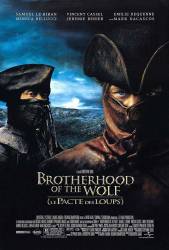Jean-Francois de Morangias: So tell me sir, do they speak of the beast in Paris?
Gregoire De Fronsac: Speak of it? They're already singing songs about it.
Geneviève de Morangias: Instead of singing songs, they should be saying prayers.
Sylvia: Do you know how Florentine women ensure their husbands come home? Every morning they slip him a slow poison, and every evening the antidote. That way, when the husband spends the night away, he has a very bad night.
Gregoire De Fronsac: You needn't resort to that.
Thomas d'Apcher: And you, Mani? Which one will you choose?
Gregoire De Fronsac: Mani doesn't use firearms.
Mani: Too much noise, too much smoke, bad smell.
Mani: All women have the same color when the candle is out.






Answer: The ending is set during the French Revolution. The Marquis is going to be executed because he is an aristocrat.
raywest ★